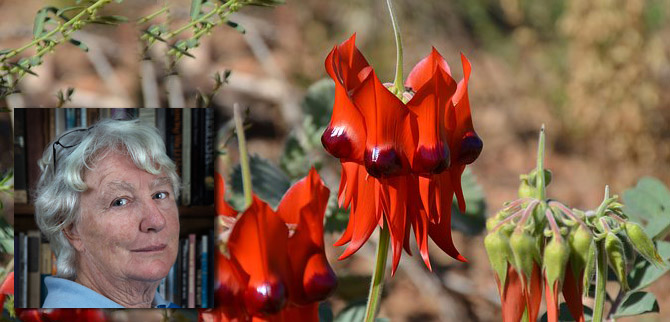On reading Young Eliot beside an open window in my kitchen, poem by Finola Moorhead
In September,
the scented breeze.
Every year I leave the jasmine weed
to excite my olfactory sense
In other months it’s there to dismember
with secateurs, but not to poison
as I do most invasive plants.
This is analogous
to how my mind treats the sweetness
of my patriarchy: my jail and
my jailer, my civilisation, from Iron Judah
through prophets to crucifix-cathedrals
and the cultured parks of The Enlightenment
to now.
I let the vine flourish, yet
snip away its tendrils and
deny it nourishment.
I am old
I shall wear my sleeves rolled.
A woman, not a whore, found that
Babylon is a desert mound in Iraq.
***
Perhaps one day I will write
the personal facts
of being a “bleeding heart”.
Right-wing women, I find, are as tough
as old boots, while lefties let their cores weep
on the outside like the Sacred Heart of Jesus,
cicatrix forming on their skins,
making them seem rough…
You know nothing – nothing –
about the loneliness of a feminist intellectual,
her words are, at best, commentary
from the boundary – with whom
the booing crowd never agrees.
It boos her as well.
Meanwhile, out of the lifts at the MCG
rich people stroll
talking of fossil fuels and consumer confidence.
Creative destruction, fuck ’em.
I am a peasant,
I take my holidays at home.
Flex the muscle, chop the wood,
chain-saw the errant branch because you must,
you should – neurons arcing in the brain like sparks
starting impotent fires – unfinished thoughts.
The hanging gardens are lost,
are ashes and dust.
***
We are within the magic of on-going evolution.
Mesozoic dinosaurs and amoebae share
stuff with us. Amazing!
Heroic civilisation, the “Anthroposcene”!
The planet has changed because of Man.
Women,
victims of circumstance and circumstances,
history, accident, politics, genetics,
colonisation, slavery, sexual slavery and
the cruelty of biological destiny,
have had little agency.
Driven by urgency, we’re frenetic,
respecting the worth
of the earth.
***
The Bush is a place I can go
where Bleeding Hearts weep from the clay
at the edge of gravel roads
and it’s divine to kill weeds.
Once you have a radical feminist conviction,
you read everything – everything –
with its friction, even T. S. Eliot,
walking, with his trousers rolled
past gas-lamps and horse-cabs, talking
of the waste
land.
***
I age and grow sage.
You can’t fool the time gymnast for whom
weekends tumble into each other,
full moons pop like circus balloons
and balance walks a tight-rope.
In the garden, weeding, or
on the end of a vacuum cleaner,
clearing the gutters, slicing butter, lumpen intelligentsia
beating in my blood, the myth of happiness, and,
indeed, holiness occurs like a genie
from a bottle, full of promises; utter romance.
Truth lies deep in country
like the rainbow serpent, real hidden treasure.
Holy happiness permits
wreckful mines to dig profit
from the ground, and, intolerance
of pleasure.
Your mind cannot grow in a bed
of delusion.
Happiness requires an entire ecosystem.
In winter, old Tom cries, or prays, beside the Thames.
Finola Moorhead was born in 1947 in Mornington, Victoria into a Catholic family with Socialist leanings. Raised by a single mother, with two older sisters and a brother. In 1972 Finola wrote her first story and play, sent them off to The Herald Short Story Competition and The Australian National Playwright’s Conference Competition, both of which she won. Deciding at this point that she preferred writing to teaching, she accepted a position on Meanjin magazine. She is a novelist, playwright and poet who has written articles and short stories, and published five books including A Handwritten Modern Classic (1985), Quilt (1985), Remember the Tarantella (1987), Still Murder (1991/2002), Darkness More Visible (2000) and a collection of poetry, My Voice (2006). She is the author of three plays, Curtain Raiser, Horses and It Might As Well Be Loneliness. Her novel, Still Murder won the 1991 Victorian Premier’s Literary Award.
©Finola Moorhead


